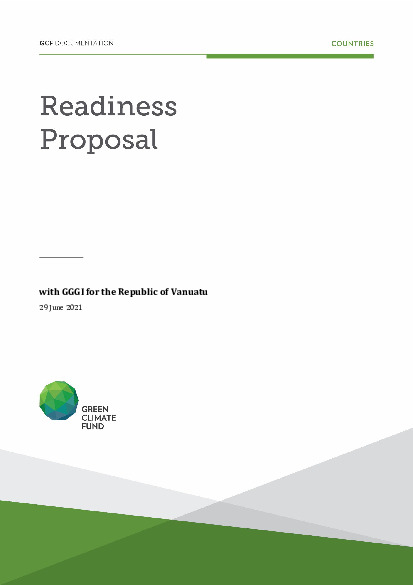Readiness Support for the Development of Vanuatu National Energy Efficiency Strategy and Action Plan

Readiness Support for the Development of Vanuatu National Energy Efficiency Strategy and Action Plan
In its NDC, Vanuatu’s planned mitigation intervention includes energy efficiency (EE) measures to be pursued across the board to enable 15% savings in the energy sector. This proposal seeks a GCF Readiness grant to support the Government of Vanuatu (GoV) in the area of EE to carry out the following activities:
- Develop a National Energy Efficiency Strategy and Action Plan (NEESAP) for Vanuatu,
- Explore and recommend opportunities for enforcement of national EE requirements including national or regional testing labs for EE appliances,
- Design an On-bill Financing (OBF) program to upscale the use of energy efficient appliances and equipment in Vanuatu, and
- Explore and recommend relevant fiscal reforms to support EE investments in Vanuatu.
In June 2016, the GoV approved the updated Vanuatu National Energy Road Map (NERM) 2016-2030 developed by the Ministry of Climate Change with support from the Global Green Growth Institute (GGGI) and the World Bank. The updated NERM identified five strategic areas for policy intervention which include accessible energy, affordable energy, secure and reliable energy, sustainable energy and green growth.
Under the sustainable energy pillar, renewable energy (RE) and EE is regarded as equally important, both have high potentials to not only help Vanuatu in saving energy cost in the long-run, but also to contribute towards reduction of national GHG emissions and contribute to achievement of Vanuatu’s NDC targets to mitigate climate change.
Much of the Government efforts over the last few years have been concentrating on electricity access through RE means, largely because of the low rate of national electrification, resulting in less EE focus and activities. Therefore, this proposal aims to mobilize attention and action to upscale EE at the national level by having in place an overarching policy framework that would serve to guide EE initiatives in support of NERM and NDC targets.
Once the draft NEESAP has been finalized, it will be submitted through the Vanuatu Government’s approval process for endorsement by the Council of Ministers, to become a nationally recognized policy document. Once endorsed, it will provide the overarching guide for EE reforms and activities in the country, including introduction and uptake of EE technologies and investments that would contribute to achieving NERM and NDC targets. This would possibly also include changes to current EE related legislation and EE related financial products that would induce use of EE products, as a means of achieving energy sustainable targets.
For activity B, the NDA would use the outcome report to dialogue with potential donors including regional development partners to finance the establishment of this testing facility/lab either as a national or regional test center.
Furthermore, the completed GCF Readiness project in Vanuatu (VUT-RS-003), implemented by GGGI, carried out a market demand assessment to support the implementation of the Vanuatu National Green Energy Fund (NGEF) and strengthened NGEF project selection criteria and project pipeline. NGEF is a national financing mechanism targeting RE and EE developments. The assessment highlighted the need to align EE mechanisms with energy access priorities to ensure strong sustainable growth. Therefore, EE has been selected as one of the priority areas for NGEF investments. Four EE projects were subsequently selected from a total of 25 projects in the pipeline. One of these projects focuses on financing appliances that meet new efficiency standards via a rebate that is recovered through the electricity bill or other methods over 1‐2 years. In line with this initiative, On-bill Financing Program (OBF Program) is being proposed as output 3.
The project beneficiaries include the Ministry of Climate Change Adaptation, Meteorology, Geo-Hazards, Environment, Energy and Disaster Management; Department of Energy; the National Green Energy Fund, the Utilities Regulatory Authority; local energy retailers and electricity operators. The OBF program will target at least 1,000 of the 16,014 grid-connected households within the first four years of its implementation in the electricity concession areas of Port Vila, Luganville, Tanna and Malekula, which are currently operated by the two private power companies - Unelco Engie and Vanuatu utilities and Infrastructures Limited (VUI).